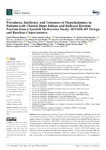Prevalence, incidence, and outcomes of hyperkalaemia in patients with chronic heart failure and reduced ejection fraction from a spanish multicentre study: SPANIK-HF design and baseline characteristics

Ver/Abrir
Use este enlace para citar
http://hdl.handle.net/2183/29857
Excepto si se señala otra cosa, la licencia del ítem se describe como Creative Commons Attribution 4.0 International Licence (CC-BY 4.0)
Colecciones
- Investigación (FCS) [1293]
Metadatos
Mostrar el registro completo del ítemTítulo
Prevalence, incidence, and outcomes of hyperkalaemia in patients with chronic heart failure and reduced ejection fraction from a spanish multicentre study: SPANIK-HF design and baseline characteristicsAutor(es)
Fecha
2022-02-22Cita bibliográfica
Delgado-Jiménez JF, Segovia-Cubero J, Almenar-Bonet L, de Juan-Bagudá J, Lara-Padrón A, García-Pinilla JM, Bonilla-Palomas JL, López-Fernández S, Mirabet-Pérez S, Gómez-Otero I, Castro-Fernández A, Díaz-Molina B, Goirigolzarri-Artaza J, Rincón-Díaz LM, Pascual-Figal DA, Anguita-Sánchez M, Muñiz J, Crespo-Leiro MG. Prevalence, incidence, and outcomes of hyperkalaemia in patients with chronic heart failure and reduced ejection fraction from a spanish multicentre study: SPANIK-HF design and baseline characteristics. J Clin Med. 2022 Feb 22;11(5):1170.
Resumen
[Abstract] Hyperkalaemia is a growing concern in the treatment of patients with heart failure and reduced ejection fraction (HFrEF) as it limits the use of some prognostic-modifying drugs and has a negative impact on prognosis. The objective of the present study was to estimate the prevalence of hyperkalaemia in outpatients with HFrEF and its impact on achieving optimal medical treatment. For this purpose, a multicentre, prospective, and observational study was carried out on consecutive HFrEF patients who were monitored as outpatients in heart failure (HF) units and who, in the opinion of their doctor, received optimal medical treatment. A total of 565 HFrEF patients were included from 16 specialised HF units. The mean age was 66 ± 12 years, 78% were male, 45% had an ischemic cause, 39% had atrial fibrillation, 43% were diabetic, 42% had a glomerular filtration rate < 60 mL/min/1.7 m2, and the mean left ventricular ejection fraction was 31 ± 7%. Treatment at the study entry included: 76% on diuretics, 13% on ivabradine, 7% on digoxin, 18.9% on angiotensin-conversing enzyme inhibitors (ACEi), 11.3% on angiotensin receptors blockers (ARBs), 63.8% on angiotensin-neprilysin inhibitors (ARNi), 78.5% on mineralocorticoid receptor antagonists (MRAs), and 92.9% on beta-blockers. Potassium levels in the baseline analysis were: ≤5 mEq/L = 80.5%, 5.1–5.4 mEq/L = 13.8%, 5.5–5.9 mEq/L = 4.6%, and ≥6 mEq/L = 1.06%. Hyperkalaemia was the reason for not prescribing or reaching the target dose of an MRAs in 34.8% and 12.5% of patients, respectively. The impact of hyperkalaemia on not prescribing or dropping below the target dose in relation to ACEi, ARBs, and ARNi was significantly less. In conclusion, hyperkalaemia is a frequent problem in the management of patients with HFrEF and a limiting factor in the optimisation of medical treatment.
Palabras clave
Hyperkalaemia
Heart failure
Medical treatment
Heart failure
Medical treatment
Versión del editor
Derechos
Creative Commons Attribution 4.0 International Licence (CC-BY 4.0)
ISSN
2077-0383






